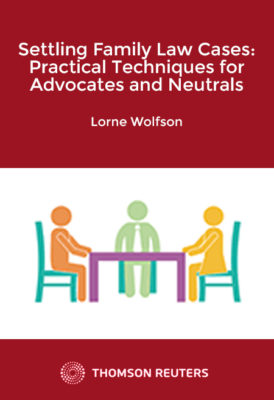 This book was published in late 2017, and its title is a mouth full; Settling Family Law Cases: Practical Techniques for Advocates and Neutrals. However, the book itself is in chewable pieces, many of which are truly savoured.
This book was published in late 2017, and its title is a mouth full; Settling Family Law Cases: Practical Techniques for Advocates and Neutrals. However, the book itself is in chewable pieces, many of which are truly savoured.
The author is Mr. Lorne Wolfson, a Toronto family lawyer, mediator, arbitrator, and partner at Torkin Manes. However, this is not really his work of art, as he has assembled chapters and writings of many of our current gurus. In fact, 14 are listed as contributors, and all of the heavy hitters are there, including but not limited to Alfred Mamo, Hilary Linton, Stephen Grant and Dr. Barbara Landau.
This is not a book that you read like a novel. One chapter does not easily flow into the next. No sooner does the book begin to talk about a topic, than it changes direction suddenly, and breaks down the topic into its component parts, often listing them by number or ranking. Your first reaction to reading this will probably be that I am making a criticism of the book. Nothing could be further from the truth. This is the book’s strong point.
The book is direct, hard hitting and realistic, in telling the reader, not only how challenging it is trying to resolve family law cases, but why it is so difficult. Then, solutions are offered.
The book begins on the subject of “Why are family law cases so difficult to settle?” This chapter alone, which is only 5 of the 262 pages of the book, may be worth the price, which is a just a little over $100. Some of his statements include the following:
“A major factor in determining when and how a family law case will settle is the dispute resolution style of the parties and their respective counsel.”
“Family law counsel are required to play a wide variety of roles, including educator, advocate, negotiator, therapist, family counselor, financial planner, career counsellor and life coach, amongst others. While some of these roles may be complimentary, often they are conflicting.”
“While in some jurisdictions mediation is still the exception rather than the rule, in others (southern Ontario, for example) mediation has become the preferred method of resolving family law cases that cannot be resolved through negotiation.”
The chapters cover specific topics, quite often doing this in about 8 or 10 pages. Lists are given as to things that you should look for, consider, and think about as you move forward. These lists can be invaluable, because once you have them in mind, you can formulate a plan for evaluating and moving forward with that specific case.
Lorne does not hesitate to repeat and draw upon the knowledge, experience and wisdom of others as he speaks of the judicial system, its complications, the role of judges at conferences or, negotiation tactics. He also discusses topics such as dealing with difficult clients or overcoming impasses.
Lorne is very familiar with the risks to individuals (the parties, lawyers and other professionals involved in family disputes) including violence, death and trauma. However, the book is optimistic that one can, through proper screening of cases, skill development, experience, and working with others, find success and gratification in practicing family law.
The purchase of Lorne’s book will not be maximized unless you go over it, turn the pages, appreciate it, and put it on your bookshelf in a handy place so that you can go back to it, time and time again. And when you go back to it, you can look at the chapters, get exactly to the point you want to be at, and read the key points again. I believe this book should be in every family lawyer’s tool box.

